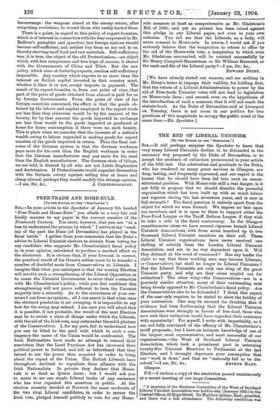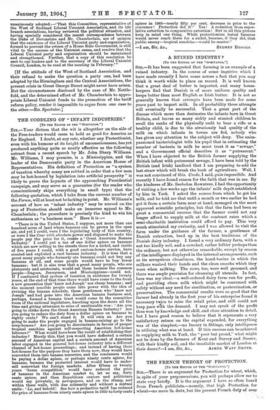[To min EDITOR OP TEM "13PEcraroa."1
SIR,—It will perhaps surprise the Spectator to learn that very many Liberal Unionists decline to be disbanded in the summary way proposed by the Duke of Devonshire, or to accept the sentence of extinction pronounced in your article of the 16th inst. Our admiration and gratitude to the Duke, who has rendered us many great services in Glasgow, are deep, lasting, and frequently expressed, and our regret is the keener that he should have been led into such an uncon- stitutional position. With Home-rule still a real danger, is it not folly to propose that we should dissolve the powerful organisation which has been built up with so much labour and expense during the last seventeen years, and is now in full strength ? The fiscal question is entirely apart from the object for which we were formed. We impose no test upon our members, and it is open to them to support either the Free-Food League or the Tariff Reform League if they wish to take a side in the fiscal controversy. In the Glasgow constituencies alone we have several vigorous branch Liberal Unionist Associations, with from seven hundred up to two thousand Liberal Unionist members on their roll. These Liberal Unionist organisations have never received one shilling of subsidy from the London Liberal Unionist Association, and are in no way dependent upon it. Will they disband at the word of command ? Has any leader the right to say that these working men may become Liberals, or Conservatives, but shall no longer be Liberal Unionists ? But the Liberal Unionists are only one wing of the great Unionist party, and why are they alone singled out for extinction ? The other wing—the Conservatives—are in a precisely similar situation, many of their outstanding men being keenly opposed to Mr. Chamberlain's fiscal policy. Are the Conservatives also to be disbanded ? I think this aspect of the case only requires to be stated to show the futility of your contention. One may be excused for thinking that if evidence had been forthcoming that the Liberal 'Unionist Associations were strongly in favour of free food, those who now seek their extinction would have regarded their existence with equanimity ! For myself, I write with impartiality, ae I am not fully convinced of the efficacy of Mr. Chamberlain's tariff proposals ; but I have an intimate knowledge of one of the largest, most representative, and most successful of our organisations,—the West of Scotland • Liberal -Unionist Association, which took a prominent part in returning twenty-five Unionist Members to Parliament at the last Election, and I strongly deprecate your assumption that our "work is done," and that we "naturally fall to be dia.
P.S.—I enclose a copy of the resolution passed unanimously at a recent meeting of our large Committee.
"A meeting of the Business Committee of the West of Scotland Liberal Unionist Association was held to-day [January 15th] in the Central Offices, 93 Hope Street. Sir Matthew Arthur, Bart., presided, and there was a full attendance. The following- resolution was
unanimously adopted That this Committee, representative of the West of Scotland Liberal Unionist Association, and its 120 branch associations, having reviewed the political situation, and having specially considered the resent correspondence between the Duke of Devonshire and Mr. Chamberlain, are of opinion that the existence of the Liberal Unionist party and organisation, formed to prevent the return of a Home Rule Government, is still vital to the success of the Unionist cause, and resolve that the Liberal Unionist party and organisation should be maintained and strengthened. Further, that a copy of this resolution be sent to our leaders and to the secretary of the Liberal Unionist Council, London, to be read at the meeting in February."
[If the attitude of the West of Scotland Association, and their refusal to make the question a party one, had been adopted by the Birmingham and the Central Associations, the present crisis in Great George Street might never have arisen. But the circumstances disclosed by the case of Mr. Nettle- fold, and the determined effort of Mr. Chamberlain to appro- priate Liberal Unionist funds to the promotion of the tariff reform policy, render it impossible to argue from one case to the other.—En. Spectator.]











































 Previous page
Previous page